June 18, 2025 | 10:27 GMT +7
June 18, 2025 | 10:27 GMT +7
Hotline: 0913.378.918
June 18, 2025 | 10:27 GMT +7
Hotline: 0913.378.918
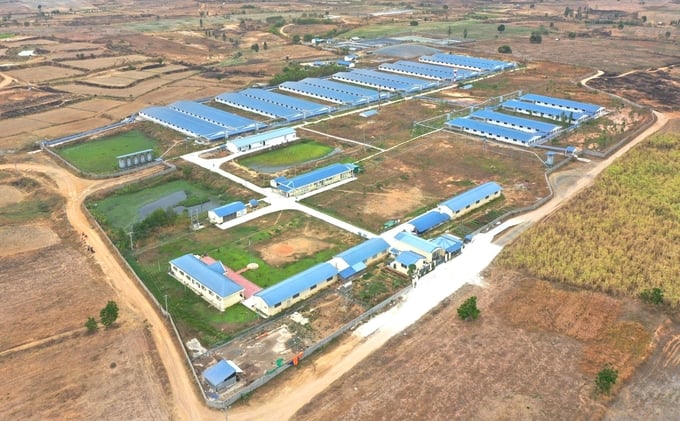
Ricky Farms pig farm. Photo: Tuan Anh.
Developing large-scale, concentrated pig farms is a trend in the Central Highlands provinces. Here, livestock farms with modern machinery and equipment, applying science and technology in the management process, contribute to improving economic efficiency as well as limiting disease risks and environmental pollution.
However, investing in large-scale pig farms in the Central Highlands still faces many difficulties, especially barriers in legal procedures that make businesses "falter".
Stepping into the Central Highlands at the end of 2019, realizing the vast land potential, low compensation, and clearance costs, along with the high ability to establish biosecurity fences in livestock activities, the Joint Stock Company Ricky Farms Group has boldly implemented key projects in Buon Don and Ea Sup districts (Dak Lak province) as well as in Phu Thien and Chu Puh districts (Gia Lai province). However, a series of problems began to appear when it came time to start construction. Barriers start from "land use plans" to "general planning for rural construction".
Mr. Hoang Thanh Tung, Chairman and General Director of Ricky Farms Group Joint Stock Company, said that in Ea Sup district, although there is a land use plan suitable for building a pig farm, the project does not exist. cannot be deployed due to problems with land origin. Up to this point, the planning for rural construction in Cu Mlan commune (Ea Sup district) has not yet been approved by the competent authorities, so investment projects are congested.
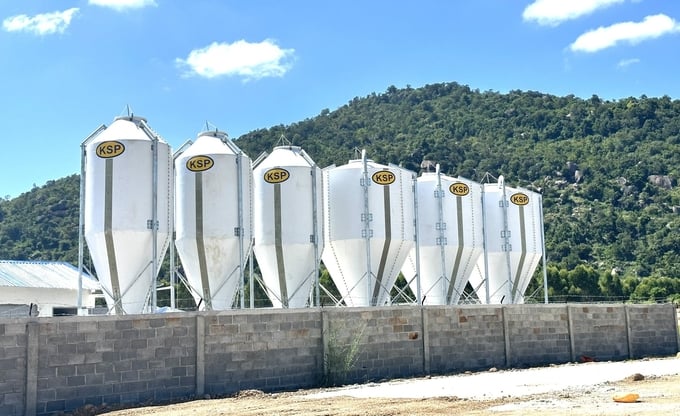
Large-scale pig farms are modernly designed, applying science and technology in animal care and management. Photo: Tuan Anh.
Meanwhile, in Gia Lai province, Ha Ngan Gia Lai Co., Ltd. registered to invest in a farm with a scale of 3,600 sows in Chu A Thai commune (Phu Thien district) and is also facing many obstacles regarding legal procedures, land use rights.
Mr. Nguyen Khanh Trung, Director of Ha Ngan Gia Lai Co., Ltd., said many officials are still weak in land law regulations. For example, it is impossible to distinguish between changing the purpose of using land for growing annual crops to other agricultural land or serving the construction of a pig farm without requiring permission from a competent state agency. The lack of legal basis for officials leads to documents being processed beyond the prescribed time and always causing delays.
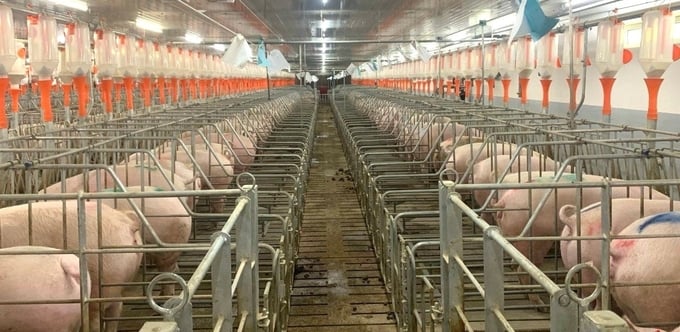
The pig farming model follows a closed process. Photo: Tuan Anh.
Similarly, in Kon Tum, many pig farming investors encounter difficulties in similar circumstances. A business that is investing in a pig farm in Tu Mo Rong district (Kon Tum province) said that investing in a large-scale pig farm in the Central Highlands is very difficult. In addition to the fact that the location of a pig farm must be far from residential areas, the legal procedures required are very cumbersome and must be censored by nearly all departments.
According to research, businesses invest in large-scale farms in the Central Highlands, especially in cooperation with multinational corporations such as C.P Group (Thailand), CJ Agri (Korea). Vietnam), Marvin (Australia)... all have modern breeding process facilities. However, the most difficult thing is still the legal framework and document verification to get approval for the investment policy.
With an area of agricultural land of about 846,000 hectares and favorable climate conditions, Gia Lai province has promoted investment attraction in 210 livestock projects, with a total investment capital of VND 36 trillion. However, to date, there are only 34 farms in operation, and many other projects have not been implemented as expected.
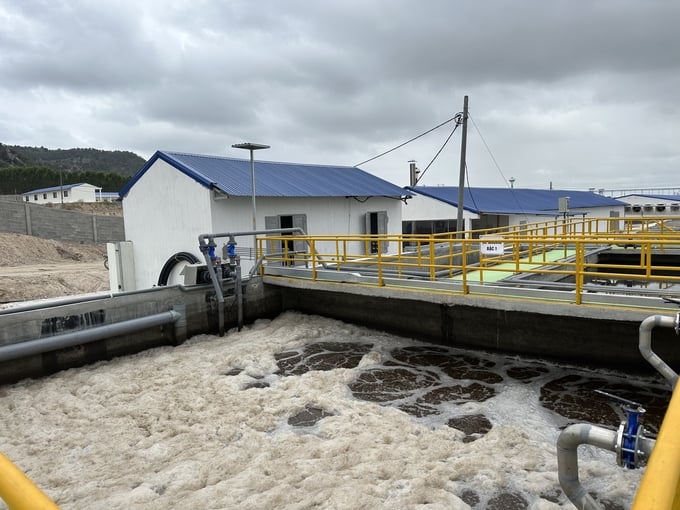
The wastewater treatment system of large-scale pig farms always meets standards. Photo: Dang Lam.
Faced with business problems, the Vice Chairman of Gia Lai Provincial People's Committee, Mr. Duong Mah Tiep, has concluded the inspection results of livestock investment projects in the province.
Accordingly, Mr. Tiep requested departments, branches and localities, based on their assigned fields and tasks, to proactively handle and guide the completion of documents and procedures for investors according to regulations. Vice Chairman of the People's Committee of Gia Lai province emphasized: "Each department, branch and locality develops specific plans to monitor and urge, periodically inspect and promptly detect and rectify shortcomings, if any, to ensure Ensuring livestock projects comply with regulations from completing documents, approving investment policies, completing project construction and putting it into operation."
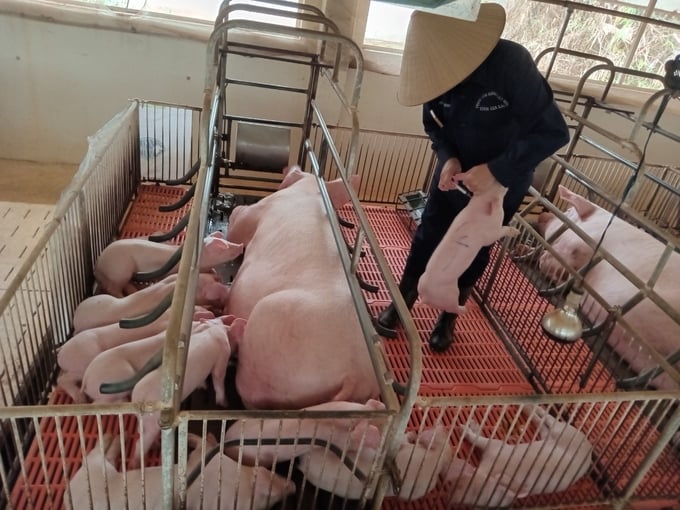
Large-scale pig farms always ensure disease safety. Photo: Dang Lam.
Mr. Tiep recently requested that the Gia Lai Department of Agriculture and Rural Development preside over and coordinate with departments, branches, and localities to review and reassess the state of investment and the recent operation of livestock projects in the province. In particular, issues about soil conditions and land use efficiency in each locality, as well as issues affecting the environment, waste treatment in livestock farming and other contents, if necessary, propose livestock density adjustments.
Faced with the barriers businesses are facing, Mr. Thai Van Dung, Director of the Department of Livestock and Veterinary Medicine of Gia Lai province, said that to help and guide organizations and individuals engaged in livestock production activities, following regulations, the province's agencies and departments must always rely on the provisions of law on animal husbandry, disease prevention, food safety, environmental protection...
Translated by Huong Giang
/2025/06/17/3942-2-143243_548.jpg)
(VAN) Recently, in Sweden, the Secretary of the Binh Dinh Provincial Party Committee presented the Investment Registration Certificate for the 'Polyester Fabric Recycling Complex' project to SYRE Impact-AB Company.
/2025/06/12/3721-2-202745_83.jpg)
(VAN) TH made an impression at Seoul Food 2025 with its line of natural beverages, paving the way for Vietnamese food products to enter the South Korean market.

(VAN) Soc Trang's success in rice exports stems from a strategy of developing fragrant and specialty rice cultivation areas and standardizing production toward low-emission practices.
/2025/06/11/1311-5-120811_839.jpg)
(VAN) The pig farming industry is facing the challenge of comprehensive restructuring to meet requirements for quality, safety, traceability, and market expansion both domestically and for export.

(VAN) Vietnam considers participating in ALGROALBA in order to expand agricultural production, coordinate the assessment and effective exploitation potential land.
/2025/06/05/5314-1-184727_407.jpg)
(VAN) From seemingly worthless fish scales and skin, enzymes and lactic ferments can transform by-products into peptides, opening a sustainable, effective business direction and elevating Vietnamese seafood.

(VAN) TTC AgriS and IFC signed a strategic partnership to develop a sustainable agricultural value chain, aiming to achieve the Net Zero target by 2035.